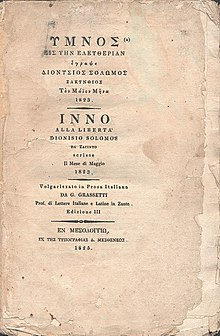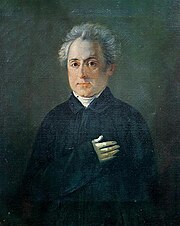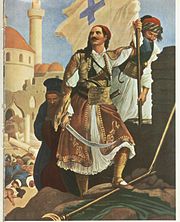| English: Hymn to Liberty | |
|---|---|
| Ὕμνος εἰς τὴν Ἐλευθερίαν Ὕμνος πρὸς τὴν Ἐλευθερίαν | |
 | |
National anthem of Greece and Cyprus | |
| Lyrics | Dionysios Solomos, 1823 |
| Music | Nikolaos Chalikiopoulos Mantzaros, 1865 |
| Adopted | 1864 (by Greece)[1] 1966 (by Cyprus)[2] |
| Audio sample | |
U.S. Navy Band instrumental version | |
The "Hymn to Liberty", or "Hymn to Freedom" (Greek: Ὕμνος εἰς τὴν Ἐλευθερίαν,[a] also Ὕμνος πρὸς τὴν Ἐλευθερίαν),[b] is a poem written by Dionysios Solomos in 1823 that consists of 158 stanzas and it is used as the national anthem of Greece and Cyprus.
It was set to music by Nikolaos Mantzaros in 1828 and is the longest national anthem in the world by length of text.[3]
It officially became the national anthem of Greece in 1864 and Cyprus in 1966.

Dionysios Solomos wrote "Hymn to Liberty" in 1823 in Zakynthos, and one year later it was printed in Messolonghi.[1] In October 1824 it was published in London by the Philhellenic Committee, and an Italian translation was published in the Messolonghi newspaper Ellinika Chronika at about the same time.[1]
It was set to music in 1828 by the Corfiot operatic composer Nikolaos Mantzaros, who composed a choral versions, in 24 parts, and dedicated it to the first King of Greece, Otto.[1] Otto awarded Mantzaros with the Silver Cross of the Order of the Redeemer as a token of appreciation, but during Otto's reign (1832–1862), an anthem based on God Save the King was used, with a text glorifying Otto.[1]
After Otto's ouster in 1862, the "Hymn to Liberty" was adopted as the national and royal anthem of Greece in 1864.[1] The "Hymn to Liberty" was also adopted as the national anthem of Cyprus by order of the Council of Ministers in 1966.[4]


Inspired by the Greek War of Independence, Solomos wrote the hymn to honour the struggle of Greeks for independence after centuries of Ottoman rule.[5][6][7]
"Hymn to Liberty" recounts the misery of the Greeks under the Ottomans and their hope for freedom. He describes different events of the War, such as the execution of Patriarch Gregory V of Constantinople, the reaction of the Great Powers, extensively the Siege of Tripolitsa and the Christian character of the struggle.
The following are the first 8 verses of the national anthem of Greece.[8]
For the full lyrics, click here.
| Greek original[1] | Transliteration | IPA transcription[c] | Poetic English translation[8][9] (Rudyard Kipling, 1918) |
Literal English translation[10] |
|---|---|---|---|---|
1.Σε γνωρίζω από την κόψη |
Se gnorízo apó tin kópsi |
[se‿ɣno.ˈɾi.zo‿a.ˈpo tiŋ‿ˈɡop.si] |
We knew thee of old, |
I know you from the blade |
An adapted version was used during the short-lived Cretan State as the Cretan Anthem. The "Hymn to Liberty" had been the Greek royal anthem after 1864.
"Hymn to Liberty" has been the national anthem of Cyprus since 1966.[2]
"Hymn to Liberty" has been performed at every closing ceremony of the Olympic Games, to pay tribute to Greece as the birthplace of the Olympic Games.
The version commonly played by military bands is an arrangement composed by Lieutenant Colonel Margaritis Kastellis (1907–1979), former director of the Greek Music Corps.[20]